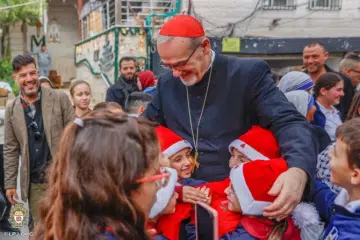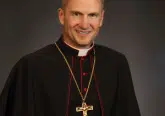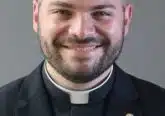Archdiocesan Pastoral Council hears report on stewardship
Wednesday, May 20, 2009
By Carmen M. Hubbard
DAYTON DEANERY — Stewardship as a way of life was the theme of a presentation made to members of the Archdiocesan Pastoral Council (APC) at their May 16 meeting at the University of Dayton.
“It’s our hope to properly reach people in a way that’s deeper than just giving money,” said Michael Vanderburgh, director of the Stewardship Office of the Archdiocese of Cincinnati, which oversees the annual Catholic Ministries Appeal (CMA).
Vanderburgh described a Christian steward as someone who receives God’s gifts gratefully; cherishes and tends to them in a responsible and accountable manner; shares them in justice and love and returns them with increase to the Lord.
 |
| Coadjutor Archbishop Dennis M. Schnurr listens as Archbishop Daniel E. Pilarczyk makes a point at the May 16 APC meeting in Dayton. (CT/Carmen M. Hubbard) |
He suggested that ways to foster stewardship include asking “ourselves to prayerfully examine the blessings that God has bestowed on us, compare our current efforts with what we believe God is asking of us and, where necessary, (reorganize) our priorities.”
Vanderburgh added that stewardship involves being “focused constantly on our spirituality and on our temporality, engaging others about stewardship by helping them discover and recognize their God-given gifts of personal talents and resources.”
Stewardship also provides relevant ways to use those gifts within the parish community and elsewhere to invite others to participate, he noted.
Brian Doyle, associate director of the Stewardship Office, discussed stewardship as a way of life.
“It’s a commitment to follow Jesus, no matter the cost,” he told the group. “(It is) the realization that everything we have is a gift from God and that we need to treasure and enhance these gifts and give them back.”
Stewardship is the recognition that what we have is not ours, Doyle said.
APC member and Sister of Charity Catherine Kirby asked Doyle and Vanderburgh where Catholic schools fit in with stewardship. The directors responded that it is up to pastors to determine when students are introduced to stewardship. The council suggested stewardship be introduced to children, especially high school students, who can learn to give as they enter adulthood.
The CMA is currently at $3.1 million, just $900,000 away from reaching its annual goal, Vanderburgh told the council.
Formerly called the Archdiocesan Annual Fund Drive, proceeds from the CMA go toward archdiocesan ministries, education for seminarians, deacons and lay pastoral ministers; Catholic Charities of Southwest Ohio/Catholic Social Services of the Miami Valley; chaplains for hospitals and prisons; college campus ministries; St. Rita School for the Deaf and the retired priests fund.
“Stewardship is more than just about money,” Vanderburgh said. “If CMA were only about money, we could raise the assessment. Every dollar gets divided like the pie chart.”
“I hated the change (of the Archdiocesan Annual Fund Drive to CMA),” said APC member Carolyn Meyers-Hughes. “I felt I had to make a choice, and I didn’t want to make a choice. Now I understand that stewardship is a way of life.”
Also as part of the day’s meeting, Karen Kane, director of the archdiocesan Worship Office, discussed with the council the importance of providing amenities for parishioners with disabilities. For example, parishes that have a sloped floor can be difficult for those who use wheelchairs. Some parishioners, however, don’t necessarily have a disability to need special accommodations; some could have a back injury or problems with their knees, Kane said.
“The U.S. Conference of Catholic Bishops has been very strong about making statements of inclusion for those who would like to proclaim the word of God,” she told the council. “How are our parishes welcoming people with disabilities? A lot of times we only think about the entrance to the church. There’s a reason why you don’t see these people in the church.”
Kane said being inclusive of others is part of the Catholic respect life teaching. She asked about the how inclusive ministries are, whether to people of different races or those with special needs.
“A lot of times they’re just making it the best they can,” Kane said. “The church involves all of us and we want everyone’s gifts and talents to be used.”
Archbishop Daniel E. Pilarczyk agreed with the need for parishes to accommodate people.
“Confirmation planners need to be aware if sponsors have special needs,” he said during the meeting.













